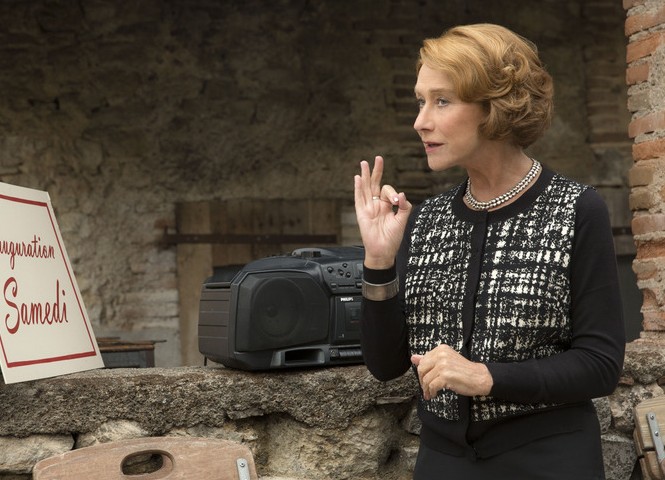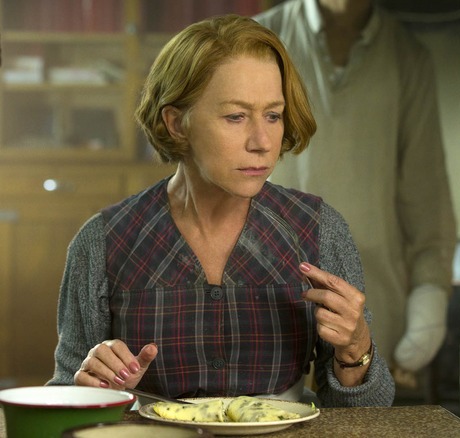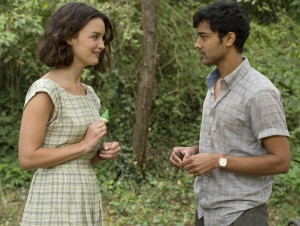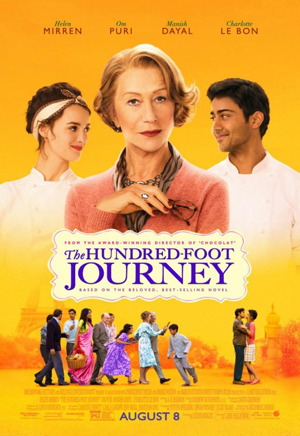
Hundred-Foot Journey Harmless Foodie Fluff
After being forced to leave India, Papa Kadam (Om Puri) has been leading the surviving members of his close-knit family across Europe trying to find the perfect place to settle down and open a new restaurant specializing in their impeccably prepared ethnic recipes. When their van breaks down in Saint-Antonin-Noble-Val, a tiny village in the south of France, he takes it as a sign from his dearly departed wife that this is the place to plant new roots.
Problem is, the vacant restaurant he’s got his eye on is right across the street from the luxurious Le Saule Pleureur, a Michelin-starred destination run by the icy Madame Mallory (Helen Mirren). Papa isn’t worried. His youngest son Hassan (Manish Dayal) has a gift that goes beyond all gastronomic boundaries, defying easy categorization or speculation. No matter what Madame Mallory wants to throw the family’s way, this budding chef will surprise everyone with the savory delights he will ultimately concoct, not even a blossoming romance with Le Saule Pleureur’s sous chef Marguerite (Charlott e Le Bon) derailing his quest for culinary immortality.

Based on the best-selling book by Richard C. Morais, with a script by Steven Knight (Locke), director Lasse Hallström’s The Hundred-Foot Journey is one of the better films he’s made in quite some time, probably since 2006’s The Hoax, maybe even 1999’s The Cider House Rules. At the same time, that doesn’t make it much more than harmless foodie fluff, the movie telegraphing the majority of its moves right from the start not particularly caring that it does so. More than that, it goes on for at least two endings too many, laconically strolling to a conclusion that sadly dilutes the inherent emotional potency of Hassan’s climactic determinations in the process.
Not that it matters as much as one might initially surmise. There is a handsome effortlessness to both Knight’s script as well as Hallström’s confident direction that makes a lot of this undeniably melodramatic hokum far easier to stomach than by all rights it should be. He also gets superb performances from his core quartet, Mirren and Puri – no surprise – in particular, each of them enlivening that what are on the surface trite and overly familiar characters making them magnetically so much more than the sum of their collectively antediluvian parts.
The first half works best. The Kadam family’s unintended stopover in Saint-Antonin-Noble-Val, their collective meet-cute with the bubbly Marguerite, the discovery of the empty restaurant leading to the subsequent war of wills between Papa and Madame Mallory, all of it is rather enchanting, the frothy charms cooked up easy to digest. It is here that Hallström appears to be most at ease, crafting a winsome milieu that in many ways recalls the director’s previous, undisputed triumphs My Life as a Dog and What’s Eating Gilbert Grape.
Unfortunately things do not progress in this vein throughout. At a certain point Madame Mallory takes note of Hassam’s budding skill while at the same time the war between the feuding restaurants comes to a rather sudden – if admittedly believable – end, both events leading to twists and turns that are neither shocking nor surprising. Things trudge along predictably, success and triumph happening along with the requisite realizations true happiness isn’t always what one expects it to be. It all builds to a finale that takes forever to happen, and thanks to a few endings too many the impact the denouement ultimately does impart is frustratingly rather forgettable.
At the same time Hallström’s hand isn’t near as heavy as it easily could have been. When that fact is coupled with the collective grace of the actors, Linus Sandgren’s (American Hustle) suitably lush cinematography and A.R. Rahman’s (127 Hours) nicely modulated score it allows the movie to maintain a welcoming atmosphere even when the inherently saccharine nature of the narrative undermines the proceedings. The Hundred-Foot Journey doesn’t bring pain to the pallet, and while its tastes aren’t especially succulent they still go down relatively easy nonetheless.
Film Rating: 2.5 out of 4







